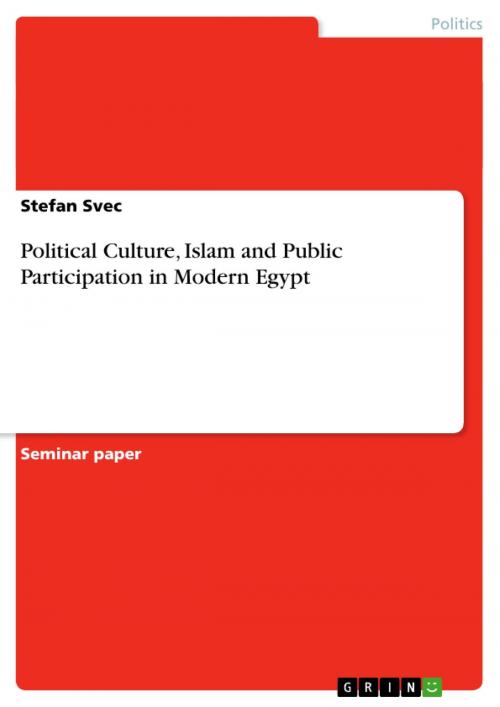Political Culture, Islam and Public Participation in Modern Egypt
Nonfiction, Social & Cultural Studies, Political Science, International, International Relations| Author: | Stefan Svec | ISBN: | 9783638288668 |
| Publisher: | GRIN Publishing | Publication: | July 7, 2004 |
| Imprint: | GRIN Publishing | Language: | English |
| Author: | Stefan Svec |
| ISBN: | 9783638288668 |
| Publisher: | GRIN Publishing |
| Publication: | July 7, 2004 |
| Imprint: | GRIN Publishing |
| Language: | English |
Seminar paper from the year 2004 in the subject Politics - International Politics - Region: Near East, Near Orient, grade: very good, University of Vienna (Institute for Politcal Science), course: African Political Systems, language: English, abstract: In the vast field of political culture on the one hand and public participation, respectively democratisation, on the other hand I will start by limiting the field of my study by defining its aims. My first guiding thesis is that there is a cleavage between state and society in Egypt and I want to show some aspects and dimensions of its present status and its historical origins. The two central fields of my study will be firstly the actual secular state practice and its ideological origins and secondly Islam, its influence in Egyptian society, and its compatibility to liberal trends, the concept of civil society or democracy in general. To look at public participation in any state is an ambitious task, for the field of participation is broad and hard to measure. I will deal with political public participation. Public participation can be limited to social groups, like syndicates. By aims I am referring to the fact that different groups have different participatory intentions. This aspect becomes more interesting when looking at Islamist groups. Looking at public participation is at the same time looking at democratic processes and political culture of the society being analysed. This includes regarding in what way the preconditions for political participation are provided: Freedom of opinion and expression, freedom of assembly, freedom of press and last but not least education. Political culture includes as well many cultural aspects of the society analysed, here Islam comes in as a religion as well as a theoretical system for a society respectively a state. All those being components of political culture, the basic research questions are consequently: What is public participation, or rather what will be the definition I will base my study on? What are the components of Egyptian political culture? What definition of civil society is adequate for Egypt? Is civil society only a term employed by 'Western' scientists based on 'Western' concepts and developments and thus not appropriate to describe Egyptian society? The second central thesis of my study is that Egypt, still an authoritarian state, has begun a process of liberalisation to provide the possibility of political participation to its people. The aim of my research is to investigate how far this liberalisation went until today and what consequences this process has for Egyptian society. Thus the question of legitimacy will be a central one.
Seminar paper from the year 2004 in the subject Politics - International Politics - Region: Near East, Near Orient, grade: very good, University of Vienna (Institute for Politcal Science), course: African Political Systems, language: English, abstract: In the vast field of political culture on the one hand and public participation, respectively democratisation, on the other hand I will start by limiting the field of my study by defining its aims. My first guiding thesis is that there is a cleavage between state and society in Egypt and I want to show some aspects and dimensions of its present status and its historical origins. The two central fields of my study will be firstly the actual secular state practice and its ideological origins and secondly Islam, its influence in Egyptian society, and its compatibility to liberal trends, the concept of civil society or democracy in general. To look at public participation in any state is an ambitious task, for the field of participation is broad and hard to measure. I will deal with political public participation. Public participation can be limited to social groups, like syndicates. By aims I am referring to the fact that different groups have different participatory intentions. This aspect becomes more interesting when looking at Islamist groups. Looking at public participation is at the same time looking at democratic processes and political culture of the society being analysed. This includes regarding in what way the preconditions for political participation are provided: Freedom of opinion and expression, freedom of assembly, freedom of press and last but not least education. Political culture includes as well many cultural aspects of the society analysed, here Islam comes in as a religion as well as a theoretical system for a society respectively a state. All those being components of political culture, the basic research questions are consequently: What is public participation, or rather what will be the definition I will base my study on? What are the components of Egyptian political culture? What definition of civil society is adequate for Egypt? Is civil society only a term employed by 'Western' scientists based on 'Western' concepts and developments and thus not appropriate to describe Egyptian society? The second central thesis of my study is that Egypt, still an authoritarian state, has begun a process of liberalisation to provide the possibility of political participation to its people. The aim of my research is to investigate how far this liberalisation went until today and what consequences this process has for Egyptian society. Thus the question of legitimacy will be a central one.















